| Srl | Item |
| 1 |
ID:
109106
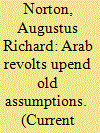

|
|
|
| 2 |
ID:
144803
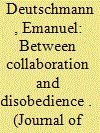

|
|
|
|
|
| Summary/Abstract |
This article examines the behavior of the Guantánamo detainees in terms of collaboration and disobedience and how it influences their chances of getting a release recommendation. Joint Task Force Guantanamo–authored memoranda on 765 detainees are used to create a network of accusations between detainees and an attribute data set, which are analyzed using multivariate regression and Kolmogorov–Smirnov tests. It is found that while the distribution of incriminating statements obeys a power law, 62.6 percent of all detainees do not incriminate anyone. Yemenis and Saudi Arabians heavily overcontribute regarding incriminating statements and disobedient actions, whereas Afghans and Pakistanis undercontribute. Disobedient behavior does not affect the likelihood of getting a release recommendation, except for hunger striking, which has a negative effect. By releasing information, detainees don’t improve their own chances of getting release recommendations but impair those of the detainees they implicate. Three different groups of detainees are identified whose behavioral patterns seem to follow distinct logics.
|
|
|
|
|
|
|
|
|
|
|
|
|
|
|
|
| 3 |
ID:
174145
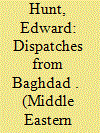

|
|
|
|
|
| Summary/Abstract |
When the dissident media group WikiLeaks published more than a quarter-million US diplomatic cables from 2010 to 2011, it included thousands of cables written by US diplomats involved in the War in Iraq (2003–2011). Although the scholarly literature covers many aspects of the war from the perspective of US officials, it has largely excluded the viewpoints captured by the WikiLeaks cables. In this article, I use the cables to reveal the thinking of US diplomats during one of the most violent phases of the war, the sectarian war, which peaked from 2006 to 2007. The cables document the sectarian cleansing of Baghdad from 2006 to 2007 and provide new information about the factors that caused the rise and fall of sectarian violence. The cables show that US actions contributed to the sectarian violence.
|
|
|
|
|
|
|
|
|
|
|
|
|
|
|
|
| 4 |
ID:
097964
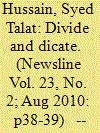

|
|
|
| 5 |
ID:
102698
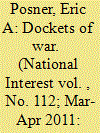

|
|
|
|
|
| Publication |
2011.
|
| Summary/Abstract |
SMART BOMBS cannot take out WikiLeaks. Stealth bombers cannot eliminate the bad odor wafting around Guantánamo Bay. Unmanned drones armed with Hellfire missiles cannot stop foreign countries and NGOs from putting America "on trial" for targeted killings. Lawfare is taking over international relations-or so many people believe. The most awesome military power in the world blunders about like a helpless giant in a dark room, swarmed by hostile forces that it cannot see and cannot attack.
|
|
|
|
|
|
|
|
|
|
|
|
|
|
|
|
| 6 |
ID:
108856
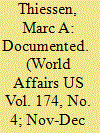

|
|
|
| 7 |
ID:
126320
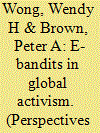

|
|
|
|
|
| Publication |
2013.
|
| Summary/Abstract |
In recent years, WikiLeaks and Anonymous have made headlines distributing confidential information, defacing websites, and generating protest around political issues. Although many have dismissed these actors as terrorists, criminals, and troublemakers, we argue that such actors are emblematic of a new kind of political actor: extraordinary bandits (e-bandits) that engage in the politics of no one via anonymizing Internet technologies. Building on Hobsbawm's idea of the social bandit, we show how these actors fundamentally change the terms of global activism. First, as political actors, e-bandits are akin to Robin Hood, resisting the powers that be who threaten the desire to keep the Internet free, not through lobbying legislators, but by "taking" what has been deemed off limits. Second, e-banditry forces us to think about how technology changes "ordinary" transnational activism. Iconic images of street protests and massive marches often underlie the way we as scholars think about social movements and citizen action; they are ordinary ways we expect non-state actors to behave when they demand political change. E-bandits force us to understand political protest as virtual missives and actions, activity that leaves no physical traces but that has real-world consequences, as when home phone numbers and addresses of public officials are released. Finally, e-banditry is relatively open in terms of who participates, which contributes to the growing sense that activism has outgrown organizations as the way by which individuals connect. We illustrate our theory with the actions of two e-bandits, Anonymous and WikiLeaks.
|
|
|
|
|
|
|
|
|
|
|
|
|
|
|
|
| 8 |
ID:
117565
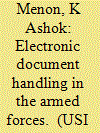

|
|
|
| 9 |
ID:
181535
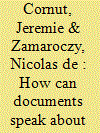

|
|
|
|
|
| Summary/Abstract |
Practice theorists favor interviews and participant observations in their study. Using insights from anthropological works on bureaucratic texts, in this article we develop methodological tools to complement these interpretive methods of data collection. We suggest a way to trace practices by systematically looking through both the content of documents and their form. We probe this approach with an analysis of 408 diplomatic cables sent by the US Embassy in Dar es Salaam, Tanzania in 2005–2009 and subsequently released by Wikileaks. We draw on these documents to tell two related stories about diplomatic practices: the first about epistemic practices and how the cables privilege certain voices and types of knowledge over others, and the second about diplomatic culture, where the cables serve as evidence of the powerful socialization processes that diplomats are subject to. This contributes to International Relations (IR) with a new approach for systematically analyzing written documents to uncover international practices.
|
|
|
|
|
|
|
|
|
|
|
|
|
|
|
|
| 10 |
ID:
116380
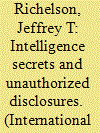

|
|
|
|
|
| Publication |
2012.
|
| Summary/Abstract |
For some, the New York Times is an infuriating newspaper. They may object to the well-left-of-center opinions of its editorial board, rampant nonsense from the keyboards of Thomas Friedman and Paul Krugman, or the evident bias in the news stories on its front page that provide daily entries for TimesWatch. 1 Undoubtedly, a number of United States Presidents have been among those who found the Times annoying for those reasons.
|
|
|
|
|
|
|
|
|
|
|
|
|
|
|
|
| 11 |
ID:
099249
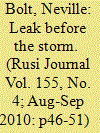

|
|
|
| 12 |
ID:
103115
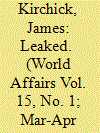

|
|
|
| 13 |
ID:
116835
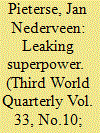

|
|
|
|
|
| Publication |
2012.
|
| Summary/Abstract |
While US government agencies endorse and support the democratic potential of the internet and social media overseas, the criticisms of the WikiLeaks disclosures of US diplomatic cables reveal the bias in relation to transparency and democracy. This poses a wider problem of connectivity combined with hegemony. This paper discusses what the criticisms of the WikiLeaks disclosures reveal. After discussing the enthusiasm about 'hyper-connectivity', the paper turns to the WikiLeaks disclosures, and next spells out global ramifications of the leaked cables, the problems of transparency and hegemony, frictions between democracy and democratisation, and the role of banks blocking donations to WikiLeaks.
|
|
|
|
|
|
|
|
|
|
|
|
|
|
|
|
| 14 |
ID:
147377
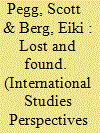

|
|
|
|
|
| Summary/Abstract |
De facto states are typically seen as marginal actors in the international system. Although they control territory and provide governance, their claims to sovereignty remain largely unrecognized. It is widely believed that such entities are either ignored or viewed with hostility by the vast majority of sovereign states. Rather than theoretically presume such relations, we empirically investigate de facto state–great power interactions through the use of a novel data set comprising 448 “WikiLeaks” US diplomatic cables from 2003 to 2010. Specifically, we examine US relations with the four de facto states of Abkhazia, Nagorno-Karabakh, Somaliland, and Northern Cyprus to test four different hypotheses designed to explain what determines the degree of US support or hostility toward individual de facto states. We find that hostility/support and isolation/engagement often go hand in hand, yet vary significantly across our selected cases. De facto states are not treated as homogenous entities and US foreign policy is quite capable of discriminating between them and calibrating its interactions with them.
|
|
|
|
|
|
|
|
|
|
|
|
|
|
|
|
| 15 |
ID:
105604
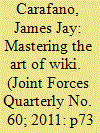

|
|
|
| 16 |
ID:
102871
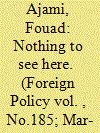

|
|
|
| 17 |
ID:
106546
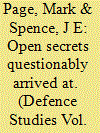

|
|
|
| 18 |
ID:
150489
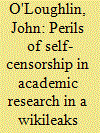

|
|
|
|
|
| Summary/Abstract |
For the past six years, the availability of WikiLeaks data—including the SIGACTS violent event data for Afghanistan and Iraq as well as the diplomatic cables—has posed an important challenge for international relations and conflict researchers. Despite the evident attractions of the vast trove of primary data involving US military and diplomatic interests, only a few peer-reviewed academic papers have been published. The reluctance to analyze WikiLeaked information is mostly due to self-censorship. Because of its character, we cannot reliably know why American academics engage in self-censoring, but worries about repercussions for career prospects or fear of prosecution are probable. Despite threats of legal consequences by governmental officials, none have occurred (to my knowledge). Academics who have publicly spurned analysis of WikiLeaks information have made two arguments, either a) that it is against US law to access the data and/or that it helps America’s enemies or b) that the materials in the leaks are not worthy of much attention since they are not earth-shattering or unexpected. Neither of these claims holds much validity.
|
|
|
|
|
|
|
|
|
|
|
|
|
|
|
|
| 19 |
ID:
152661
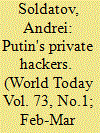

|
|
|
| 20 |
ID:
122629
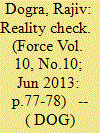

|
|
|